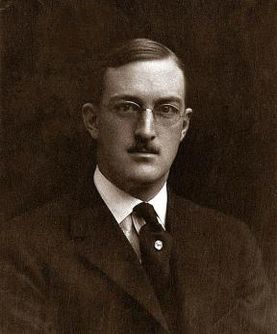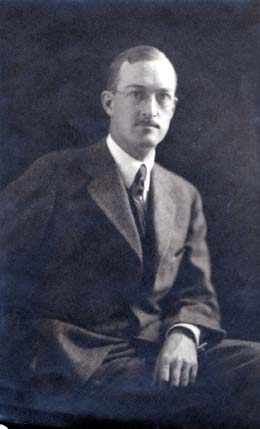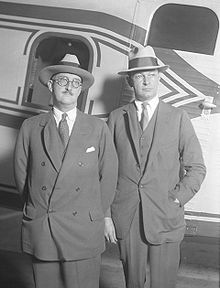<Back to Index>
- Aviation Pioneer William Edward Boeing, 1881
- Composer Paul Abraham Dukas, 1865
- Holy Roman Emperor Charles VI, 1685
PAGE SPONSOR



William Edward Boeing (October 1, 1881 – September 28, 1956), born "Wilhelm Edward Böing", was an American aviation pioneer who founded The Boeing Company.
Born to a wealthy German mining engineer named Wilhelm Böing who had made a fortune and who had a sideline as a timber merchant. Anglicizing his name to "William" after returning from being educated in Switzerland in 1900 to attend Yale University, William Boeing left Yale in 1903 to go into the lumber side of the business. He bought extensive timberlands around Grays Harbor on the Pacific side of the Olympic Peninsula. He also bought into lumber operations.
While president of Greenwood Timber Company,
Boeing, who had experimented with boat design,
travelled to Seattle, where, during the Alaska - Yukon - Pacific
Exposition in
1909, he saw a manned flying machine for the first
time and became fascinated with aircraft.
In 1916, Boeing went into business with George Conrad Westervelt as B & W and founded the Pacific Aero Products Co. When America entered the First World War in April 1917, Boeing changed the name of Pacific Aero Products Co. to Boeing Airplane Company and obtained orders from the United States Navy for 50 planes. At the end of the war, Boeing began to concentrate on commercial aircraft, secured contracts to supply airmail service and built a successful airmail operation.
In 1921 William Boeing married Bertha Marie Paschall. She had previously been married to Nathaniel Paschall, a real estate broker with whom she bore two sons, Nathaniel "Nat" Paschall Jr. and Cranston Paschall. These two sons became Boeing's stepsons. The couple had a son of their own, William E. Boeing Jr. The stepsons went into aviation manufacturing as a career. Nat Paschall was a sales manager for Douglas Aircraft and then McDonnell Douglas. William E. Boeing Jr. became a noted private pilot and industrial real estate developer. Bertha was the daughter of Howard Cranston Potter and Alice Kershaw Potter. Through her father, Bertha was a descendant of merchant bankers Alexander Brown of Baltimore, James Brown and Brown's son - in - law and partner Howard Potter of New York; and through her mother, the granddaughter of Charles James Kershaw and Mary Leavenworth Kershaw (a descendant of Henry Leavenworth).
In 1934, the United States government accused William Boeing of monopolistic practices. The same year, the Air Mail Act forced airplane companies to separate flight operations form development and manufacturing. William Boeing divested himself of ownership as his holding company, United Aircraft and Transport Corporation, broke into three separate entities:
- United Aircraft Corporation, holding the former eastern US manufacturing (now United Technologies Corporation);
- Boeing Airplane Company, with western US manufacturing, which later became The Boeing Company;
- United Air Lines for flight operations.
Boeing Airplane Company, though a major manufacturer in a fragmented industry, did not really take off until the beginning of World War II.
The year of the divestiture, Boeing retired from the aircraft industry. He then spent the remainder of his years in property development and thoroughbred horse breeding. His thoroughbred farm northeast of Seattle was called Aldarra. Aldarra was later developed by William E. Boeing Jr. as a luxury residential development in 2000.
William Boeing died on September 28, 1956, at the age of 74, just three days before his 75th birthday. He was pronounced dead on arrival at the Seattle Yacht Club, having had a heart attack aboard his yacht.